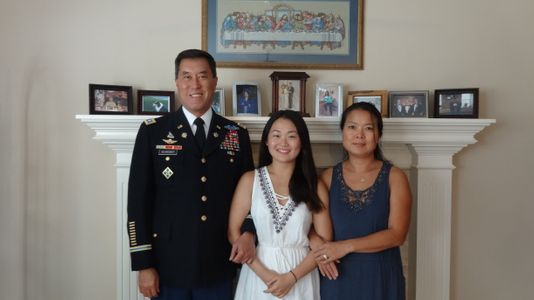There are exceptions for EVERY rule…
 A federal judge in Kansas has ruled that a South Korean-born teenager, who was adopted by her aunt and uncle in Kansas, will have to leave the country right after graduation from college because of a disparity between state and immigration laws regarding a child’s age at the time of her adoption.
A federal judge in Kansas has ruled that a South Korean-born teenager, who was adopted by her aunt and uncle in Kansas, will have to leave the country right after graduation from college because of a disparity between state and immigration laws regarding a child’s age at the time of her adoption.
Hyebin Schreiber was brought to the United States in 2012 at the age of 15 by now-retired Army Lt. Col. Patrick Schreiber of Lansing, Kansas and his wife, Soo Jin, who met in South Korea when he was stationed there in 1995, according to the Kansas City Star.
Schreiber delayed a formal adoption, in large part because the 27-year Army veteran spent much of 2013 and 2014 in Afghanistan, where he served as an intelligence officer.
He told the Star that he was advised by his lawyer that he could wait to finalize the adoption until Hyebin was 17. However, that rule only applies to the adoption of native-born Americans.
Under federal immigration law, foreign-born children must be adopted before they turn 16 to derive citizenship from an American. The birth certificate issued by Kansas was, in the eyes of the federal government, essentially null and void.
The bottom line: Hyebin will have to leave the country after she graduates from Kansas University, where she is a senior studying biochemistry.
U.S. District Judge Daniel Crabtree said in ruling against the family that the federal immigration law is “not ambiguous” and that the U.S. Citizenship and Immigration Services “interpreted the statue in accordance with its plain meaning.”
In March, Sen. Roy Blunt, R-Mo., introduced a bill that would, if passed, remove the disparity by extending U.S. citizenship to foreign-born children adopted by Americans before the age of 18.
The family told KCTV before the ruling that they were planning to move the entire family to South Korea if Hyebin was going to be deported.
 “I’m going to go back to Korea too. I can’t leave her, Soo-Jinn Schreiber said.
“I’m going to go back to Korea too. I can’t leave her, Soo-Jinn Schreiber said.
One long-shot possibility: A U.S. company might be willing to give her a work visa.
In a March interview with The Star, the father blamed himself for not fully researching rules on adopting immigrants.
Looking back, he regretted not pursuing the adoption before time ran out. “I should have put my family ahead of the Army,” he said.
Written by Doug Stanglin for US Today ~ Septmeber 29, 2018
FAIR USE NOTICE: This site contains copyrighted material the use of which has not always been specifically authorized by the copyright owner. We are making such material available in our efforts to advance understanding of environmental, political, human rights, economic, democracy, scientific, and social justice issues, etc. We believe this constitutes a ‘fair use’ of any such copyrighted material as provided for in section 107 of the US Copyright Law. In accordance with Title 17 U. S. C. Section 107, the material on this site is distributed without profit to those who have expressed a prior interest in receiving the included information for research and educational purposes. For more information go to: http://www.law.cornell.edu/uscode/17/107.shtml
